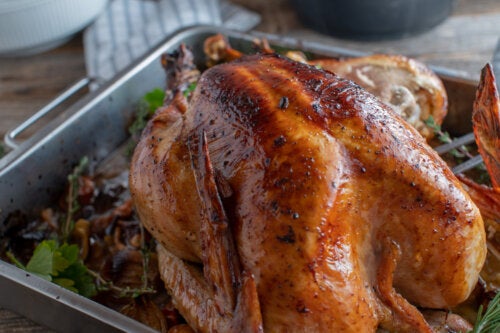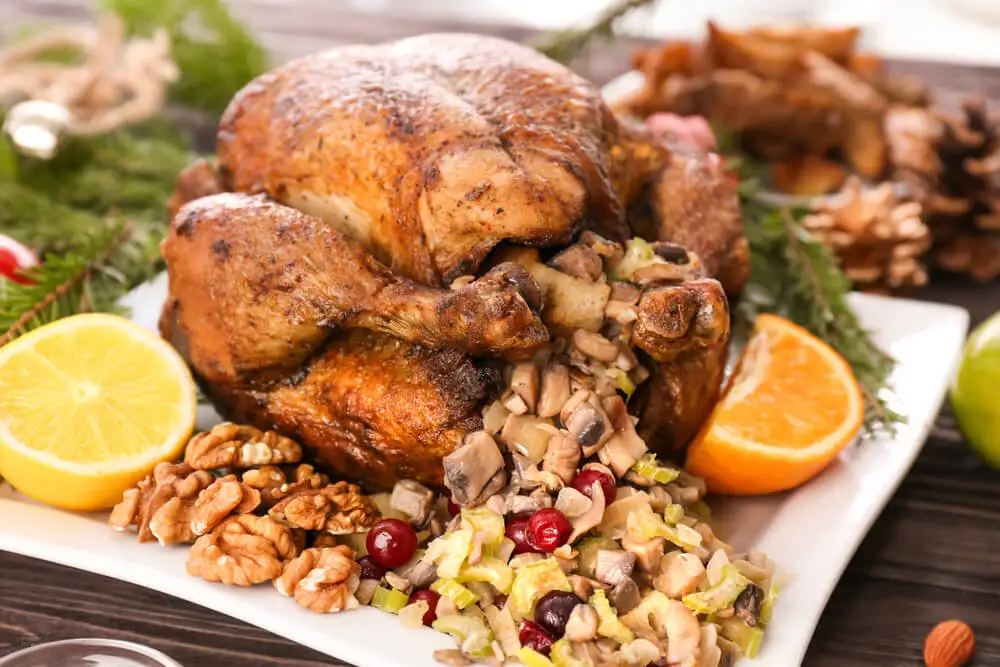How Harmful Is It to Eat Turkey Skin?


Reviewed and approved by the doctor Leonardo Biolatto
These days – and especially around the holidays – many people wonder if the consumption of turkey skin is harmful to health. This type of meat is usually the protagonist of Thanksgiving and Christmas Eve preparations – not only for its flavor, but also for the multiple ways of cooking it. Baked, roasted, smoked, with spices, in sauces… there are dozens of recipes to enjoy it!
The best of all is that this is a food with a high nutritional quality. In fact, as an American Heart Association publication states, turkey is an important source of high-biological value proteins, as well as B vitamins and minerals such as phosphorus, iron, calcium, and zinc. But is it good to eat its skin?
Turkey skin: More good fat than bad
Undoubtedly, one of the reasons why some people avoid turkey skin is because of its fat content. For decades, the idea has been widespread that it’s an abundant source of saturated fats that are detrimental to our health.
However, these beliefs have been disproved by nutrition professionals. Through the CNN Medical Unit blog, Lilian Cheung, editorial director of The Nutrition Source, from the Harvard School of Public Health, explains that it isn’t necessary to give up turkey skin.
According to the expert, poultry skin contains more monounsaturated fat than saturated fat. And while it is true that it adds a little more calories to the dish, it isn’t a problem when consumed in moderation and on time.
On the contrary, including sources of monounsaturated fats in the diet has some benefits. In fact, a study reported in the journal Missouri Medicine concludes that this type of fat helps reduce body weight and control insulin resistance when ingested as part of a low-carbohydrate diet.
Meanwhile, a publication in Food & Nutrition Research exposes the debate on saturated fat intake. In relation to this, a couple of randomized controlled trials reported that they do not increase the risk of cardiovascular disease. Still, it’s suggested to keep their intake below 10% of your total daily energy intake.
While it is true that turkey skin contains saturated fat, its intake is unlikely to raise cholesterol or triglyceride levels. As with other foods, the key is to know how to moderate the portions consumed.

We think you may also enjoy reading this article: Turkey and Chicken Meat: What Are the Differences?
The cooking method matters
A detail that should not be ignored when preparing the turkey for Christmas Eve is the cooking method. When it comes to taking care of your health and weight, avoid recipes that involve frying or the addition of trans fats.
Research shared in the journal Nutrients details that methods such as boiling and roasting are linked to a healthier cardiometabolic profile. Specifically, they contribute to lower body mass index, weight, and heart disease risk.
Another good option is air fryer preparation, an appliance that has gained popularity for offering advantages in cooking food. As explained by dietician Ariana Cucuzza in a publication by the Cleveland Clinic, air frying reduces calorie intake by 70-80% compared to normal frying.
These elements have a thermal process with an innovative technology that makes it possible to obtain similar characteristics (texture and flavor) to traditional frying, but without adding oils or using high temperatures. Right now, air frying is considered one of the most convenient and healthy types of cooking.
Like this article? You may also like to read: The Top 10 Countries that Consume the Most Calories Per Day and What The Diet Is Like
Other recommendations to consume turkey with skin in a healthy way
Due to its nutritional composition, turkey is one of the healthiest meats that can be incorporated into a healthy diet. It’s also clear that it’s not strictly necessary to remove the skin, since it isn’t as harmful as previously thought.
Whether or not you eat turkey is skin is a matter of taste.
Even so, it’s advisable to put other tips into practice to ensure healthier and calorie-controlled dishes. This includes the following:
- Opt for recipes that include abundant vegetables and spices.
- If oil is necessary, choose a healthy option, such as olive, coconut, or canola oil.
- Marinate the turkey with spices, citrus juices, or vinegar. These ingredients enhance its flavor without affecting its nutritional quality.
- Avoid recipes that include added sugars, industrial sauces, flours, and ultra-processed foods.
- Serve moderate portions.

We think you may be interested in reading this, too: Smart Eating: How to Design a Balanced Weekly Menu
Turkey meat: The best option for a Thanksgiving or Christmas dinner
Preparing turkey for Christmas dinner isn’t just a tradition; it’s one of the best alternatives in terms of nutrition and health to take care of yourself during the holidays.
This food contains proteins of high biological value – that is, with a good profile of essential amino acids. It’s also a source of B vitamins and minerals (such as iron, zinc, and copper), which are key to promoting wellness.
As long as it’s consumed in moderate portions – and as part of a healthy diet – turkey can be an ally to take care of weight and metabolic health without having to give up delicious recipes. So, how do you like to prepare it?
All cited sources were thoroughly reviewed by our team to ensure their quality, reliability, currency, and validity. The bibliography of this article was considered reliable and of academic or scientific accuracy.
- Merschel, M. (November 23, 2021). Is turkey healthy for you? Read this before you gobble any. American Heart Association News. Available in: https://www.heart.org/en/news/2021/11/23/is-turkey-healthy-for-you-read-this-before-you-gobble-any
- Falco, M. (November 23, 2010). Turkey skin: More good fat than bad, and other Thanksgiving truths. CNN Medical. Available in: https://thechart.blogs.cnn.com/2010/11/23/turkey-skin-more-good-fat-than-bad-and-other-thanksgiving-truths/#:~:text=%22There%20is%20more%20monounsaturated%20fat,of%20skin%20may%20be%20advisable.
- DiNicolantonio JJ, O’Keefe JH. Monounsaturated Fat vs Saturated Fat: Effects on Cardio-Metabolic Health and Obesity. Mo Med. 2022 Jan-Feb;119(1):69-73. PMID: 36033137; PMCID: PMC9312452.
- Svendsen K, Arnesen E, Retterstøl K. Saturated fat -a never ending story? Food Nutr Res. 2017 Sep 19;61(1):1377572. doi: 10.1080/16546628.2017.1377572. PMID: 29056889; PMCID: PMC5642188.
-
Rodríguez-Ayala M, Sandoval-Insausti H, Bayán-Bravo A, Banegas JR, Donat-Vargas C, Ortolá R, Rodríguez-Artalejo F, Guallar-Castillón P. Cooking Methods and Their Relationship with Anthropometrics and Cardiovascular Risk Factors among Older Spanish Adults. Nutrients. 2022 Aug 20;14(16):3426. doi: 10.3390/nu14163426. PMID: 36014932; PMCID: PMC9414627.
- Air-Frying: Is It As Healthy As You Think?. (October 28, 2019). Cleveland Clinic. Available in: https://health.clevelandclinic.org/air-frying-is-it-as-healthy-as-you-think/
-
Marangoni F, Corsello G, Cricelli C, Ferrara N, Ghiselli A, Lucchin L, Poli A. Role of poultry meat in a balanced diet aimed at maintaining health and wellbeing: an Italian consensus document. Food Nutr Res. 2015 Jun 9;59:27606. doi: 10.3402/fnr.v59.27606. PMID: 26065493; PMCID: PMC4462824.
This text is provided for informational purposes only and does not replace consultation with a professional. If in doubt, consult your specialist.








